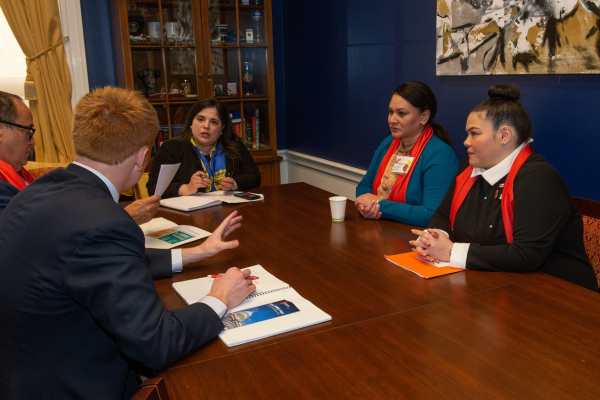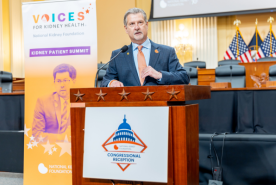April 24, 2023
UPDATE: On April 26, the US House of Representatives passed a bill that included the proposals below, and now it is with the Senate for consideration. Please contact your Senators and ask them to Protect Medicaid and Oppose Work Requirements.
House Republicans released their plan to address the looming debt ceiling crisis. While we appreciate the need to reduce deficit spending, we are concerned that Medicaid work requirements and other proposals included in this bill could potentially harm some of our most vulnerable citizens, including members of our kidney patient community.
On April 19th, House Republicans released their plan to address the looming debt ceiling crisis. While NKF appreciates the need to reduce deficit spending, Medicaid work requirements and other proposals included in this bill would harm some of our most vulnerable citizens, including members of our kidney patient community.
What the Debt Ceiling Proposal Means
The debt ceiling proposal expands existing work requirements for the Supplemental Nutrition Assistance Program (SNAP) and Temporary Assistance for Needy Families (TANF) program and institutes new work requirements for Medicaid beneficiaries. Many kidney patients rely on Medicaid and many patients in kidney failure are dually eligible under the ESRD Medicare benefit and Medicaid. Medicaid covers important services like non-emergency medical transportation to dialysis treatment and long-term services and supports like nursing homes.
Kidney Patients Benefit from Access to Medicaid

One study1 found that access to Medicaid consistently improved health outcomes for dialysis patients, decreasing the number of patients dying during their first year on dialysis by the hundreds. Likewise, work requirements for Medicaid access led many patients to lose their coverage without increasing employment levels.2
This is often due to onerous paperwork and red tape required to prove compliance with work requirements or exemption from them. Regardless, requiring work or “community engagement” for Medicaid healthcare is not good for patients. NKF is collaborating with other patient groups and the Partnership to Protect Coverage to ask Members of Congress to vote “No” on any bill that would institute such requirements.
Wrong Time for Spending Cuts and Regulatory Roadblocks
In addition to work requirement proposals, the “Limit, Save, Grow Act” includes Regulations from the Executive in Need of Scrutiny Act of 2023 (REINS Act). This act would add major roadblocks to health-protective regulations by requiring Congress to approve all “major” rules issued by federal agencies within a 70-day window.
This includes public health rules from:
- The Centers for Medicare and Medicaid Services
- The Environmental Protection Agency
- The Food and Drug Administration
- Other federal agencies that protect the health and safety of American citizens
Under the REINS Act, the default would be Congress blocking important and critical protections including clean air, public health, safety, and healthcare measures that have already been authorized by current law. NKF and many other patient groups oppose this legislation and ask Congress to remove it from any debt ceiling negotiations.
Finally, the GOP Debt Ceiling proposal cuts federal spending to Fiscal Year 2022 levels and caps increases in the federal budget to 1% per year, far below the rate of annual inflation. Such cuts and caps would mean large decreases in important health-related discretionary programs and could damage the hard-won increases to NIDDK’s kidney disease research and the CDC’s awareness, prevention, and surveillance programs. Learn about the FY 23 Labor, Health and Human Services, and Education Appropriations bill.
Taken together, the provisions in this bill do not serve our kidney patient community and stand to hurt our most vulnerable patients, while rolling back important investments for kidney disease research, awareness, and prevention.
Read or watch NKF CEO, Kevin Longino’s recent testimony urging Congress to continue boosting federal kidney disease program funds.
Your Voice Makes All the Difference

Become a Voices for Kidney Health advocate to urge Congress’ support for kidney policy priorities and ensure kidney funding keeps pace with kidney disease. We can’t do it without you.
Sources
1Swaminathan S, Sommers BD, Thorsness R, Mehrotra R, Lee Y, Trivedi AN. Association of Medicaid Expansion With 1-Year Mortality Among Patients With End-Stage Renal Disease. JAMA. 2018;320(21):2242–2250. doi:10.1001/jama.2018.16504
2Wagner, Jennifer, and Jessica Schubel. “States’ Experiences Confirm Harmful Effects of Medicaid Work Requirements.” Center on Budget and Policy Priorities, 18 Nov. 2020, cbpp.org/research/health/states-experiences-confirm-harmful-effects-of-medicaid-work-requirements.

















